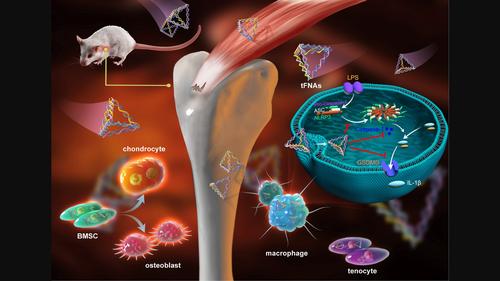当前位置:
X-MOL 学术
›
Cell Prolif.
›
论文详情
Our official English website, www.x-mol.net, welcomes your feedback! (Note: you will need to create a separate account there.)
Effect of tetrahedral framework nucleic acids on the reconstruction of tendon-to-bone injuries after rotator cuff tears
Cell Proliferation ( IF 8.5 ) Pub Date : 2024-01-28 , DOI: 10.1111/cpr.13605 Pinxue Li 1, 2 , Liwei Fu 1, 2 , Chao Ning 1 , Jiang Wu 1 , Zizheng Xu 1, 2 , Zhiyao Liao 1, 2 , Cangjian Gao 1 , Xiang Sui 1 , Yunfeng Lin 3 , Shuyun Liu 1 , Zhiguo Yuan 4 , Quanyi Guo 1, 2
Cell Proliferation ( IF 8.5 ) Pub Date : 2024-01-28 , DOI: 10.1111/cpr.13605 Pinxue Li 1, 2 , Liwei Fu 1, 2 , Chao Ning 1 , Jiang Wu 1 , Zizheng Xu 1, 2 , Zhiyao Liao 1, 2 , Cangjian Gao 1 , Xiang Sui 1 , Yunfeng Lin 3 , Shuyun Liu 1 , Zhiguo Yuan 4 , Quanyi Guo 1, 2
Affiliation

|
Clinicians and researchers have always faced challenges in performing surgery for rotator cuff tears (RCT) due to the intricate nature of the tendon-bone gradient and the limited long-term effectiveness. At the same time, the occurrence of an inflammatory microenvironment further aggravates tissue damage, which has a negative impact on the regeneration process of mesenchymal stem cells (MSCs) and eventually leads to the production of scar tissue. Tetrahedral framework nucleic acids (tFNAs), novel nanomaterials, have shown great potential in biomedicine due to their strong biocompatibility, excellent cellular internalisation ability, and unparalleled programmability. The objective of this research was to examine if tFNAs have a positive effect on regeneration after RCTs. Experiments conducted in a controlled environment demonstrated that tFNAs hindered the assembly of inflammasomes in macrophages, resulting in a decrease in the release of inflammatory factors. Next, tFNAs were shown to exert a protective effect on the osteogenic and chondrogenic differentiation of bone marrow MSCs under inflammatory conditions. The in vitro results also demonstrated the regulatory effect of tFNAs on tendon-related protein expression levels in tenocytes after inflammatory stimulation. Finally, intra-articular injection of tFNAs into a rat RCT model showed that tFNAs improved tendon-to-bone healing, suggesting that tFNAs may be promising tendon-to-bone protective agents for the treatment of RCTs.
中文翻译:

四面体框架核酸对肩袖撕裂后肌腱骨损伤重建的影响
由于肌腱-骨梯度的复杂性和有限的长期有效性,临床医生和研究人员在进行肩袖撕裂 (RCT) 手术时始终面临挑战。同时,炎症微环境的出现进一步加剧组织损伤,对间充质干细胞(MSC)的再生过程产生负面影响,最终导致疤痕组织的产生。四面体框架核酸(tFNA)作为一种新型纳米材料,由于其强大的生物相容性、优异的细胞内化能力和无与伦比的可编程性,在生物医学领域显示出巨大的潜力。本研究的目的是检验 tFNA 是否对随机对照试验后的再生具有积极作用。在受控环境中进行的实验表明,tFNA 阻碍了巨噬细胞中炎症小体的组装,导致炎症因子释放减少。接下来,tFNA 显示对炎症条件下骨髓 MSC 的成骨和软骨分化发挥保护作用。体外结果还证明了tFNA对炎症刺激后肌腱细胞中肌腱相关蛋白表达水平的调节作用。最后,将 tFNA 关节内注射到大鼠 RCT 模型中表明,tFNA 改善了肌腱到骨的愈合,这表明 tFNA 可能是用于治疗 RCT 的有前途的肌腱到骨保护剂。
更新日期:2024-01-29
中文翻译:

四面体框架核酸对肩袖撕裂后肌腱骨损伤重建的影响
由于肌腱-骨梯度的复杂性和有限的长期有效性,临床医生和研究人员在进行肩袖撕裂 (RCT) 手术时始终面临挑战。同时,炎症微环境的出现进一步加剧组织损伤,对间充质干细胞(MSC)的再生过程产生负面影响,最终导致疤痕组织的产生。四面体框架核酸(tFNA)作为一种新型纳米材料,由于其强大的生物相容性、优异的细胞内化能力和无与伦比的可编程性,在生物医学领域显示出巨大的潜力。本研究的目的是检验 tFNA 是否对随机对照试验后的再生具有积极作用。在受控环境中进行的实验表明,tFNA 阻碍了巨噬细胞中炎症小体的组装,导致炎症因子释放减少。接下来,tFNA 显示对炎症条件下骨髓 MSC 的成骨和软骨分化发挥保护作用。体外结果还证明了tFNA对炎症刺激后肌腱细胞中肌腱相关蛋白表达水平的调节作用。最后,将 tFNA 关节内注射到大鼠 RCT 模型中表明,tFNA 改善了肌腱到骨的愈合,这表明 tFNA 可能是用于治疗 RCT 的有前途的肌腱到骨保护剂。



























 京公网安备 11010802027423号
京公网安备 11010802027423号